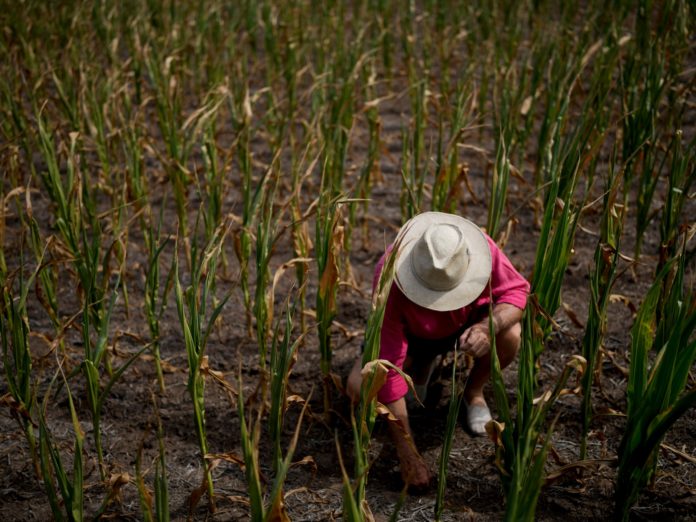Among the bleakest findings in the latest report of the United Nations Intergovernmental Panel on Climate Change (IPCC), released last week, is the conclusion that climate resilient development will be increasingly out of reach in some regions if global temperatures increase above 2C. And this challenge will be even harder to overcome with every subsequent incremental increase in warming.
A warmer world would compound the climate injustice already playing out today in the least developed and vulnerable countries of the Global South. These countries and communities have historically contributed the least to greenhouse gas emissions, which have already pushed temperatures up by 1.1C, yet they are on the front line of climate impacts.
A 2C increase would mean that primary sectors like agriculture would be increasingly unable to cope with extreme weather events, such as droughts and floods, undermining long-term food, nutrition and economic security in many parts of the world. The consequences could put 80 million people across sub-Saharan Africa, South Asia and Central America at risk of hunger by 2050, thereby also increasing the risk of displacement.
The stark IPCC warning should, therefore, be an urgent invocation to accelerate agricultural innovation on two counts.
Front-line countries simultaneously need more and better ways to adapt to new climate realities to keep food on the table and clean, sustainable solutions that limit emissions and ensure such adaptation remains possible. Both are critical for keeping alive the possibility of delivering climate justice and must be implemented through context-specific policies.
The new report was released at a moment of global stocktaking both for climate action and food systems. It is as much a status update as it is a warning for the future. Climate change is already affecting farmers worldwide with about half of the world’s population facing severe water scarcity for at least some of the year, in part because of climatic factors.
But it is hitting those hardest who have emitted the least and who are least equipped to adapt – in particular, smallholder farmers in the Global South. As the most climate-exposed sector, agriculture, especially in developing countries, urgently needs integrated solutions that can minimise environmental impacts, support adaptation and reduce inequality.
Yet only 1.7 per cent of climate finance in 2020 supported the world’s hundreds of millions of smallholder farmers. If the international community does not ramp up climate finance for food systems to correct this imbalance, more people will go hungry.
The good news is that governments, development donors and philanthropic foundations need not wait for breakthrough solutions to invest in this sector. Many either already exist or are in development.
Agricultural innovations offer opportunities to adapt to extremes such as droughts, floods and heatwaves while also delivering up to 30 percent of the urgent emissions reductions needed to limit temperature rises to 1.5C, a threshold the world is likely to reach within the next decade.
For example, scientists are testing climate-resilient varieties of staple crops like rice that can both thrive in extreme conditions and reduce agricultural emissions. Evidence suggests that direct seeded rice requires up to a third less water and emits up to 90 percent less methane, all while providing the same yields.
Similarly, research has found that an improved variety of grass can increase soil carbon storage while reducing nitrous oxide emissions to offset the climate impact of livestock. Koronivia grass, native to Africa, can also grow on marginal land, meaning farmers can make use of degraded soils to maintain livestock production even where food crops cannot grow.
And technologies such as solar-powered irrigation pumps that allow farmers to sell surplus solar energy back to the grid can replace high-emitting diesel pumps while disincentivising the overconsumption of groundwater. A vast and growing suite of agricultural innovations exists to give developing countries the best chance of preserving food security in the face of crippling climate extremes.
While such technological innovations are an important part of the solution, the IPCC report also emphasises the importance of inclusive institutions and policies to ensure the most impacted communities have a voice in decisions that affect their lives. Technologies deployed without adequate understanding of local contexts and constraints can lead to counterproductive outcomes.
The question now is how to scale up these innovations quickly enough to withstand the climate extremes that are already inevitable while holding even worse outcomes at bay by reducing emissions around the world.
Without rapid, deep and sustained mitigation by the highest-emitting economies, adaptation alone will not suffice.
The latest IPCC report should be the starting point for urgent, comprehensive action at a global level. Success in climate-proofing food systems would not only position all of humanity to cope with the impacts of rising temperatures but would also create the conditions for greater equality, delivering climate justice through climate resilience.
The views expressed in this article are the author’s own and do not necessarily reflect Al Jazeera’s editorial stance.

